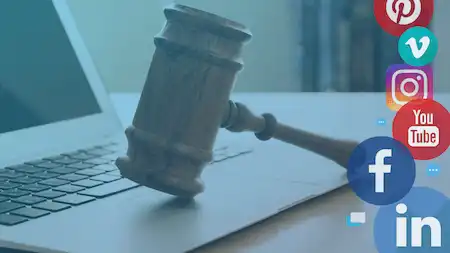Public Records Laws and Social Media Retention in
Texas
Texas Public Records Laws Compliance
Texas Senate Bill 944 is an amendment to the Texas Public Information Act (PIA). It defines methods for adhering to Texas public records laws and expanding government transparency, including how social media communication should be recorded and archived.
What Does Texas Senate Bill 944 Mean for You?
Texas Senate Bill 944 is an amendment to the Texas Public Information Act (PIA). It defines methods for adhering to public records laws and expanding government transparency, including how social media communication should be recorded and archived.
Under Texas Senate Bill 944, the public information officer (PIO) will be responsible for obtaining public records and protecting those records from “deterioration, alteration, mutilation, loss, or unlawful removal,” including records being created and stored on private devices of other government officials. Records that qualify as public information are not protected by the record holder’s current or previous position and must be maintained according to the bill’s standards. Those in possession of the records must:
“Forward or transfer the public information to the governmental body or a governmental body server to be preserved […]; or preserve the public information in its original form in a backup or archive and on the privately-owned device…”
Those maintaining records on private devices are considered “temporary custodians” and must turn over public records to the PIO within ten days of the PIO’s request. This requirement means that officials conducting business (and thus creating public records) on private devices do not own or have rights over the records and should maintain the full and unaltered record, which must now be provided to the PIO for archiving.
This bill expands the growing movement to maintain government transparency. It tightens regulations related to the proper storage of public records and helps position digital communication as a means of avoiding public record laws.
Need Help Navigating Digital Records Compliance?
We have a team of specialists ready to assist you with the complexities of public records laws. Request more information from a records specialist to learn more or set up a discussion about record-keeping requirements and digital records management strategies.
How to Comply with Senate Bill 944
If you work for a government agency or school district, take the following three steps to remain compliant with Senate Bill 944:
- Avoid conducting professional business on private devices or accounts. When that does happen, quickly turn over the records to your agency’s PIO to avoid record loss or deterioration.
- Know and understand your agency’s retention policy, archival methods, and who is your current PIO.
- Use methods of capture that fully preserve and archive all information on a secure server in a searchable and reliable way.
SB 944 Texas Social Media Records Compliance Made Simple with CivicPlus®
Texas Public Information Act and Social Media
The Texas Public Information Act was modernized in 2013 to explicitly include internet postings and other electronic communications with Senate Bill 1368. This bill causes social media content to fall under Texas public records laws.
View Texas Law Text
Texas Open Government Act/SB 1368: Public Information
(c) The general forms in which the media containing public information exist include a book, paper, letter, document, e-mail, internet posting, text message, instant message, other electronic communication, printout, photograph, film, tape, microfiche, microfilm, photostat, sound recording, map, and drawing and a voice, data, or video representation held in computer memory.
Social Media Records Guidelines from the Texas Department of Information Resources (DIR)
The DIR clarifies the retention requirements for social media records in Texas in its Social Media Resource Guide and offers actionable strategies for getting started with social media in your agency.
View the DIR Social Media Guidelines
4. Records Retention
Content posted by the agency or the public on an agency’s social media website is a state record (Government Code, Section 441.180(11)), and is subject to State Records Retention requirements in Government Code Chapter 441, Subchapter L, 441.180-205.
To manage compliance, agencies may consider common exceptions to State Records Retention Requirements in developing social media content strategy.
Texas Social Media Records Management in Practice
Austin is the first City in the country to offer a completely Open Archive that is accessible to the public. The City of Dallas provides a great example of a comprehensive social media policy recognizing that social media posts are subject to public disclosure laws.
View the Dallas Social Media Policy
City of Dallas Administrative Directive on Social Media
5.2 The PIO or designee will:
Manage Open Records Requests in cooperation with all departments to ensure that responses to such requests include any responsive Content on City Social Media sites
HEAR FROM OUR CUSTOMERS
CivicPlus Social Media Archiving in Texas
Hear from one of the many cities, counties, and agencies that are meeting public record law requirements using the CivicPlus Social Media Archiving solution.

“We were interested in complying with new Public Information Act provisions. We found, after fairly extensive research, that [the CivicPlus Social Media Archiving tool] offers a reasonably-priced model that requires no proactive steps on our part. We basically turned it on and let it run.”
– Dinah Massie, Houston Transtar
Social Media Record Retention Legal News in Texas
Read about Texas cases and precedents involving social media and public record retention.

Texas A&M settles lawsuit with PETA over social media records
PETA filed a public records request for the records of A&M’s social media filters to see if they were censoring posts and comments for keywords like “dogs,” “PETA,” and “abuse.” PETA argued that these constituted records under the Texas Public Information Act. Texas A&M paid $75,000 to settle the lawsuit.
Texas Assistant Attorney General states social media records are public records after the City of Seabrook received a records request for social media comments
They City received a records request for all comments on the city police department’s social media pages. The City argued that information was not subject to the Public Information Act. However, when it appealed to the Attorney General, the Assistant Attorney General responded by stating that the comments – and all content created on social media – is subject to public records laws.